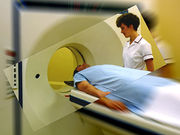However, strict procedures need to be followed
THURSDAY, Feb. 23, 2017 (HealthDay News) — Patients with cardiovascular implantable electronic devices not designed to be magnetic resonance imaging (MRI)-compatible can safely receive MRI, when a specific protocol is followed, according to a study published in the Feb. 23 issue of the New England Journal of Medicine.
The study involved 1,246 patients with standard pacemakers or implantable cardioverter-defibrillators (ICDs). They underwent a total of 1,500 MRI scans at 19 centers across the United States. All of the scans were done using the same protocol. Each patient’s device was tested non-invasively before the MRI, then reprogrammed accordingly. If possible, it was set to a no-pacing mode. But if patients had symptoms in that mode, their device was programmed a different way. After the MRI, the device was restored to its original settings, then tested again to make sure it was working properly.
The researchers found that none of the patients had a failure in their device or its wires during the MRI. And none suffered a dangerous heart-rhythm disturbance. Six patients did have atrial fibrillation or atrial flutter but each case was short-lived and stopped on its own. One ICD patient needed to have the device generator immediately replaced after the MRI.
That, said lead researcher Robert Russo, M.D., of the Scripps Research Institute in La Jolla, Calif., was because “someone left the shock function on” before the scan. The device went into non-functional mode during the MRI, then couldn’t be tested afterward. But overall, Russo told HealthDay, “we didn’t find any true risk that should stop these patients from having a medically indicated MRI.” None of the patients had an MRI of the chest, however — so it’s not clear whether the findings apply to those scans, the researchers acknowledged.
The study was partly funded by St. Jude Medical, Biotronik, and Boston Scientific, all makers of heart devices.
Copyright © 2017 HealthDay. All rights reserved.








